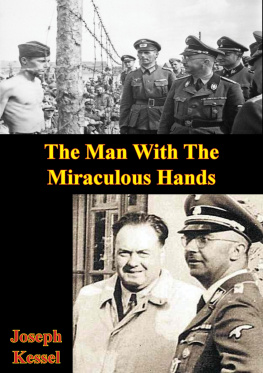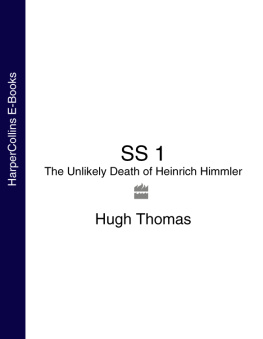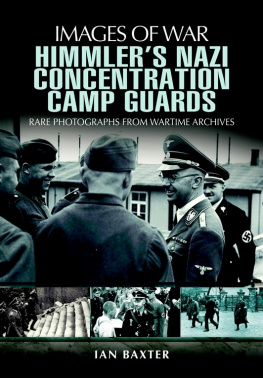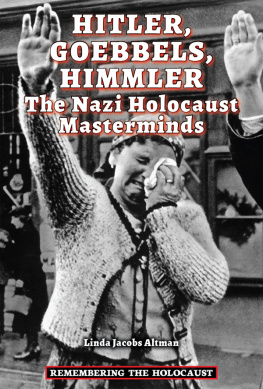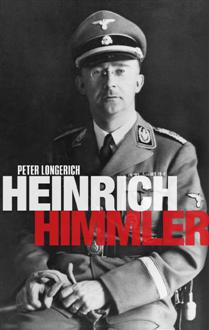6
Searching for Contacts
with the West
ATLHITOMIR, Kersten had offered to be helpful to Schellenberg by enlisting the assistance of others whom he knew had considerable influence on Himmler and whose contacts with the Western Allies could be valuable. One such person was Himmler's friend and lawyer Carl Langbehn, whom he introduced to Schellenberg.
Carl Langbehn was one of Himmler's oldest friends, dating from well before World War II. The friendship was forged after Langbehn's daughter asked her father's permission to accept an invitation to visit the home of a schoolmate. Langbehn was startled to discover that his daughter's friend was the daughter of Heinrich Himmler, described by the girl only as someone who had "something to do with the SS." The two school chums became close friends and their respective fathers, thrown together by this liaison, became friends as well. Himmler seemed to find satisfaction in his political chats with Langbehn, a brilliant lawyer, who provided a frank and refreshing voice of objective wisdom. The two men had the kind of candid exchanges of opinion that Himmler could not have with most of his Nazi colleagues.
As early as 1938, Langbehn, in his heart, had rejected Nazism. He had been enraged when his former law professor, Fritz Pringsheim, was sent off to a concentration camp because he had Jewish blood. Langbehn sought help for Pringsheim from Himmler, who obligingly had him released from camp and given permission to leave Germany. This episode was significant not only because Pringsheim's arrest and detention on racial and religious grounds soured Langbehn on Nazism, but because he saw that Himmler, whom he would serve as personal attorney, also seemed to have within him the seeds of opposition-not on ideological grounds but in his own selfinterest.
Himmler had on occasion, while talking with Langbehn, Schellenberg, and Kersten, betrayed doubts about Hitler's grandiose dreams of conquest. For all his power, Himmler had enemies who, he believed, threatened him and one day might do him in. The intramural struggle for power among Hitler's inner circle of top lieutenants was at times frightening. Himmler believed that the most insidious influence was that of Martin Bormann, particularly after he took over as Hitler's assistant following Hess's one-way flight to Scotland. And, of course, another "rotten apple" in the Nazi barrel, in Himmler's opinion, was Foreign Minister Ribbentrop, whose foreign policy advice to Hitler, he believed, was almost always bad-if not catastrophic. Despite omens of pending defeat that revealed themselves after the Wehrmacht's failure to take Moscow, Ribbentrop persisted in goading Hitler to fight on against hopeless odds. The only thing that Ribbentrop and Himmler had in common was their devotion to gaining influence in the rarefied hierarchy of the Third Reich. As a former chicken farmer, it was perhaps small wonder that Himmler was preoccupied with gaining ground in the "pecking order" of power. But so was Ribbentrop, a former champagne salesman, who resorted to such self-inflating tricks as buying a "von" to add to his family name.
During his discussions with Himmler at Zhitomir, Schellenberg emphasized "the importance of getting Germany out of the War, for now that America had entered hostilities there was no longer any hope ... of eventual success."' Himmler seemed to agree with Schellenberg, although it would soon be seen that the Reichsfuhrer SS was of two minds on this score. It would take the best efforts of Kersten and Schellenberg to keep Himmler on track. He would vacillate between his deep-seated devotion to Hitler as well as his fear of fatal opposition by infighters such as Bormann and Ribbentrop-even RSHA chief Ernst Kaltenbrunner and Gestapo chief Heinrich Muller of his own staff-on one hand, and on the other hand his conviction that his Fhrer could not win the War and must be relieved of power.
Schellenberg's remarks on this subject, given under Allied questioning after the European War had ended, were summarized by his interrogator:
Kersten shared Schellenberg's views as regards the necessity of Germany ending the war at the earliest possible moment and also believed that this could be best accomplished by Himmler taking power forcibly into his own hands and deposing Hitler.... he used his influence to support Schellenberg in his policy of an early termination of the War. In this connection can be quoted the case of ... Carl Langbehn whom Kersten introduced and who was [already] implicated in subversion activities against the ruling Nazi regime" [within the secret ranks of the Resistance].
According to Schellenberg's interrogation testimony, "This case was [later] used by `Gestapo' Mueller, albeit unsuccessfully, to involve Schellenberg and possibly Kersten in an espionage charge."'
The Resistance activities of Langbehn, referred to by Schellenberg, concerned an underground relationship with Johannes Popitz, Prussian finance minister in the early days of the Third Reich, and Ulrich von Hassell, for a while the German ambassador to Italy. Both men had been involved in the abortive putsch hatched by military dissidents led by Colonel General Ludwig Beck, chief of the army General Staff, who in 1938 did not want to risk war with Britain and France over the Sudetenland and Czechoslovakia. Strongly opposed to Hitler's military management, Beck had resigned from the army in the summer of 1938, but continued to serve as a leader in the continuing underground Resistance movement against Hitler.
Carl-Friedrich Goerdeler, once mayor of Leipzig, and Admiral Wilhelm Canaris, head of military intelligence (Abwehr), had worked with Beck in organizing this first serious plan to defy Hitler and avoid a European war. The plan, while well advanced, was abandoned when England's prime minister Neville Chamberlain signed the Munich agreement-the pact that he promised would provide "peace in our time." Chamberlain's misbegotten deal appeasing Hitler only encouraged the Fhrer to pursue further aggression, rather than deter him. And, for the time being, it cut the ground out from under the anti-Hitler military plotters.
Langbehn's friendship with Himmler and his soon-to-be role as Schellenberg's go-between with the U.S. Office of Strategic Services in neutral Stockholm and Bern complicated his simultaneous secret relationship with Canaris and other Resistance conspirators, and would ultimately cost him his life. Langbehn's Widerstand world involved him in a close relationship with Popitz and some fourteen other intellectual Resistance activists who called themselves the "Wednesday Society" because of the day on which they met secretly in Berlin. This made such military Resistance members such as Beck and Canaris most uneasy because of Langbehn's close relationship with Himmler, a rival and a man whom they abhorred. Further complicating this situation was Langbehn's connection with Popitz and his friend Albrecht Haushofer, son of Professor Karl Haushofer, author of the concept of Lebensraum, or living space, a Nazi ideological centerpiece justifying Hitler's invasion of the Soviet Union.
Albrecht Haushofer, however, had distanced himself from many of his father's views and did not consider himself a Nazi. Not only was he opposed to Hitler, he did not like or respect Himmler, either. But he was an agreeable soul and kept his more disparaging views of Nazis to himself. He had seen advantages to being close with Hess, but once his good friend was no longer on the scene, be felt exposed and unprotected from his enemies, particularly as suspicions of his intertwined Resistance activities for two rival masters, Canaris and Himmler, began to leak out to the ever-watchful Gestapo. More specifically, there were those within the Gestapo and the Sicherheitsdienst, the Nazi Party's foreign intelligence arm, who suspected that Haushofer had been the instigator of Hess's black flight to Scotland seeking peace with England-much as Heydrich had suspected Kersten of encouraging Hess in his ill-starred venture. Lord David Douglas-Hamilton, the Scottish nobleman known by his title as the duke of Hamilton, had been described by his friend Albrecht Haushofer as a man of influence in Great Britain, one who was on excellent terms with the British royal family and someone to whom Hess could usefully appeal in his quest for peace and common cause with Germany against Russian Bolshevism.'


